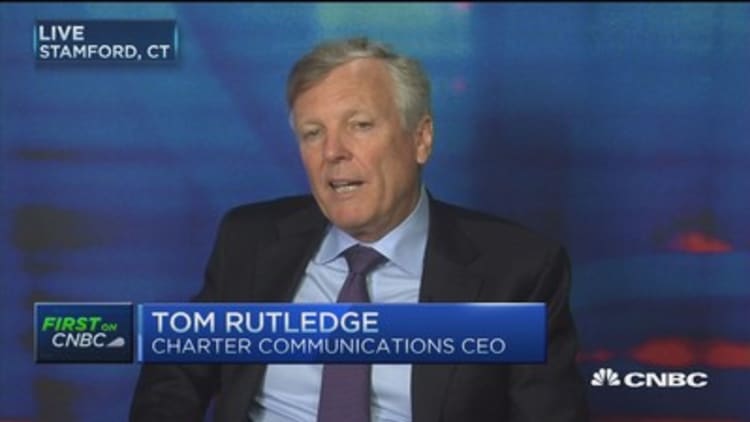
Charter Communications' acquisition of Time Warner Cable and Advance/NewhouseBright House Networks may be more just than a play to make it the second-largest cable company. If the deal is approved, Charter Communications said the three together will have 19.4 million broadband customers, including 18.8 million residential clients.
Those valuable Internet services would especially be appealing for millennials and their younger Gen Z counterparts. A 2014 study by Defy Media, HunterQualitative Research and KnoWhy Research found that 13- to 24-year-olds were watching an average of 22 hours of programming a week on free and subscriber-based digital platforms such as YouTube and Netflix but only 8.3 of scheduled linear TV content.
"A lot of these guys (telecommunications companies) are coming together because they want to best figure out how to create a package of services to do what younger consumers want and also to figure out what to do with channels people don't necessarily find utilization from," Defy Media President Keith Richman explained.
Cable network Pivot TV reported in 2013 that 13 percent of broadband customers between 13 and 34 solely subscribe to broadband services.
Charter announced on Tuesday that it plans acquire Time Warner Cable and Bright House Networks for $55 billion and $10.4 billion respectively. The potential juggernaut will become the second-largest broadband provider in the country, according to the company, servicing just shy of 30 percent of U.S. customers according to the Federal Trade Commission's minimum definition of service at 25 megabits per second (Mbps). However, it is still dwarfed by Comcast's share, which makes up 56 percent of the U.S. market.
Read MoreCharter agrees to buy Time Warner Cable for $195 a share
Plans to improve broadband services are in the works. A Charter spokesperson said it will increase Time Warner Cable customers' Internet download speeds (which start at 3 Mbps) to at least Charter's minimum level of 60 Mbps. Those who have faster connections—for example, Time Warner Cable offers plans up up to 300 Mbps—will not have their services diminished. No timeline has been set for implementation.
In addition, the spokesperson added that Charter hopes to expand its out-of-home Internet presence by adding more wireless Internet hot spots and extending its fiber-optic network, which will increase its telephone, Internet and cable television network reach.
This will allow its customers to enjoy its digital video offerings through cloud-based services and mobile apps, the spokesperson said. It also will allow consumers to view better quality over-the-top content, or media delivered via the Internet without the involvement of cable or direct broadcast satellite providers.
Defy's Richman added that while in the past the biggest media influence on youth were TV networks like MTV, those voices are no longer the clear leader. A Variety survey of 13- to 18-year-olds showed that YouTube stars made up their top five most notable "celebrities." He pointed out it was completely feasible that cable packages of the future would include some TV channels but mostly broadband-heavy services like Internet access and over-the-top companies.
"You can absolutely look at the reason behind this deal was to change their (Charter's) core product offering to attract the next generation of viewers," Richman said. "Cable services are going to be radically different from what it has been in the past."
Read MoreCharter-TWC will be 'relatively small': Rutledge
In addition, the move to provide more out-of-home Internet services could be clutch for Charter as it looks for younger customers, according to programmatic digital advertising service Celtra CEO Mihael Mikek. Currently, the company reports millennials account for 40 percent of all time spent on smartphones.
As the youth demographic becomes increasingly mobile Internet-dependent, companies that can provide more wireless services on the street level will have more business opportunities, he pointed out.
"People used to be really hooked to cable for TV channels," Mikek said. "Millennials don't care about this stuff. As long as you give them Internet access, you can give them all the content they want on all devices."


